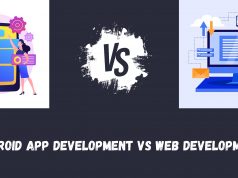Building a web application can be a daunting task, especially if you’re not sure how much it will cost. The cost of web app development in the USA can vary widely depending on a number of factors, including the complexity of the application, the features and functionality required, the development team’s experience and expertise, and the chosen development methodology.
The best way to estimate the cost of web app development is to get quotes from a few different development companies. When getting quotes, be sure to provide the development company with a detailed understanding of your requirements. This will help the development company to give you an accurate estimate.
It is also important to remember that the cost of web app development is not always the only factor to consider. The quality of the development team and the level of support that they offer are also important factors to consider.
A Guide to Estimating the Cost of Your Web Application
Beneath, you’ll find a table offering a holistic perspective on various categories of web applications. This table outlines estimated expenses, development timelines, notable features, and illustrative examples. Whether you’re contemplating a fundamental web application for personal use or an intricate, enterprise-level solution for a large corporation, this table serves as an informative resource to aid in comprehending the fundamental considerations for web app development and financial planning.
| Type of Web Application | Cost | Duration | Features | Examples |
| Basic Web Application | $15,000 to $25,000 | 2-3 months | Minimalist web app interface, basic navigation, search functionality, simple backend development | Personal portfolio blogs, news sites, online brochures |
| Medium Web App | $25,000 to $45,000 | 4-7 months | Database integration, real-time updates, advanced search and filtering, API integrations | eCommerce store, B2B SaaS applications, online forum and discussion boards, project management tools |
| Complex Web Application | $50,000 to $100,000 | 8-12 months | Extensive database operations, custom API integrations, real-time communication and collaboration | ERP systems, HRMS, LMS, CRM, health information systems, IoT platforms, financial management platforms |
| Enterprise-Level Web Application | $100,000 to $500,000+ | 12+ months | Highly customized features, complex security requirements, scalability | Custom software for large organizations, mission-critical applications |
Essential Questions for Planning Your Web App Project
Effective planning is a crucial step in the journey toward a successful web app project. By posing the following questions to yourself, you can gain a deeper insight into your project’s needs and prerequisites, enabling you to make well-informed choices regarding the development journey.
Application Type:
- What is the primary purpose and functionality of the web app you want to develop?
- Are there specific industry standards or best practices that should be considered for this type of application?
Functional Requirements:
- What are the core features and functionalities that must be included in the web app?
- Have you identified any additional features that would enhance the user experience or provide a competitive edge?
Budget:
- What is the allocated budget for the web app development project?
- Are there any cost constraints or limitations that need to be taken into account?
Deadline:
- Do you have a specific launch date or deadline in mind for the web app?
- Are there any external factors, such as market events or seasonal trends, that could impact the project timeline?
Security:
- What measures are in place to ensure the security of user data and sensitive information?
- Have you conducted a security assessment to identify potential vulnerabilities and threats?
Compliance:
- Are there specific legal or regulatory requirements that the web app must adhere to (e.g., GDPR, ADA accessibility, HIPAA)?
- Have you consulted with legal experts or compliance professionals to address these requirements?
Maintenance and Support:
- Have you outlined a plan for post-launch maintenance and support of the web app?
- What is the expected frequency of updates, and how will user inquiries or issues be addressed?
Web Development Progression: Phases and Cost Considerations
The different phases of web development all play an important role in the overall success of a project. Each phase of web development can influence the others.
| Phase | Approximately Time | Cost of Development |
| Research and Market Analysis | 1-5 weeks | $0 – $10,000 |
| Design | 1-6 weeks | $500 – $50,000 |
| Development | 2-24 weeks | $3,000 – $200,000 |
| Testing and Deployment | 1-4 weeks | $0 – $25,000 |
| Maintenance | 5 – 40 weeks | $3,600 – $335,000 |
Research and market analysis:
The findings of this phase can help to determine the target audience, the purpose of the website, and the features and functionality that are needed. For example, understanding the target audience can help you determine the tone and style of the website, as well as the content that will be most relevant to them.Design:
The design of the website can affect the user experience, the usability, and the overall success of the project. For example, a well-designed website will be easy to navigate and use, and it will be visually appealing to users.Development:
The development process can be influenced by the complexity of the website, the chosen development methodology, and the experience and expertise of the development team. For example, a complex website will require a more experienced development team and a longer development time.Testing and deployment:
The testing and deployment phases can help to identify and fix bugs, ensure that the website is accessible to users, and make sure that it is running smoothly. For example, testing can help to identify usability issues and performance problems, and deployment can help to ensure that the website is accessible to users around the world.Maintenance:
The maintenance phase can help to keep the website up-to-date, secure, and running smoothly. For example, maintenance can include updating the website with new content, fixing security vulnerabilities, and optimizing the website for search engines.
Cross-Continental IT Compensation Analysis
The average hourly rates for software engineers and other roles in the tech industry vary greatly depending on the region and the experience level of the employee. The table below shows the average hourly rates for various positions in the US, Latin America, Eastern Europe, and Asia.
| Position | US | Latin America | Eastern Europe | Asia |
| Business Analyst | $65 | $45 | $35 | $55 |
| Architect | $75 | $50 | $40 | $60 |
| Project Manager | $60 | $40 | $35 | $50 |
| Junior Developer | $40 | $30 | $25 | $40 |
| Mid-level Developer | $50 | $35 | $30 | $45 |
| Senior Developer | $60 | $40 | $35 | $50 |
| Lead Developer | $70 | $50 | $40 | $60 |
| Junior QA | $35 | $25 | $20 | $35 |
| Mid-level QA | $45 | $30 | $25 | $40 |
| Senior QA | $50 | $35 | $30 | $45 |
| Graphic Designer | $40 | $30 | $25 | $40 |
As you can see, the average hourly rates are highest in the US and lowest in Asia. This is due to a number of factors, including the cost of living, the availability of skilled workers, and the demand for tech talent.
Choosing the Right Talent: In-House, Freelancers, or Outsourcing?
In-house team
An in-house team is a group of developers who work directly for your company. This can be a good option if you need a team of developers who are familiar with your company’s specific needs and requirements. In-house teams can also be more secure, as your code and data will be kept within your company.
Advantages:
- More control over the development process
- Better communication and collaboration between developers and other team members
- Reduced risk of security breaches
- Greater flexibility in terms of project schedules and deadlines
Disadvantages:
- Can be more expensive than other options
- Can be difficult to find and hire qualified developers
- Can be slow to adapt to changes in technology
Freelancer
A freelancer is a self-employed developer who works on a project-by-project basis. This can be a good option if you need a developer with specific skills or experience that you can’t find in-house. Freelancers can also be more affordable than in-house teams.
Advantages:
- More affordable than in-house teams
- Easier to find and hire qualified developers
- Greater flexibility in terms of project schedules and deadlines
Disadvantages:
- Less control over the development process
- Communication and collaboration can be more difficult
- Increased risk of security breaches
Outsourced team
An outsourced team is a group of developers who work for a third-party company. This can be a good option if you need a team of developers with specific skills or experience that you can’t find locally. Outsourced teams can also be more affordable than in-house teams.
Advantages:
- More affordable than in-house teams
- Easier to find and hire qualified developers
- Greater flexibility in terms of project schedules and deadlines
- Can access a wider pool of talent
Disadvantages:
- Less control over the development process
- Communication and collaboration can be more difficult
- Increased risk of security breaches
The choice between in-house teams, freelancers, or outsourced talent is a pivotal decision that can greatly impact the outcome of your projects. Each option brings its own set of advantages and challenges to the table.Ultimately, the choice depends on your project’s unique demands, budget, and timeline.
Also read: Comparing In-House vs. Remote Web App Development Teams in the US
Quick Summary
In conclusion, evaluating the cost factors of web app development in the USA is a journey filled with complexities and considerations. We’ve explored the crucial elements that can influence the financial landscape of your web app project, from defining its type and functionalities to securing compliance and planning for maintenance and support.
At this juncture, we’d like to introduce you to a team of experts who specialize in navigating these intricacies – GeekyAnts. With their wealth of experience, technological prowess, and a commitment to delivering excellence, Geeky Ants is your partner in turning your web app vision into a reality. They bring not only technical expertise but also a deep understanding of the unique challenges and opportunities that come with web app development in the USA.
“Ready to Start? Contact Geeky Ants Now!”


















